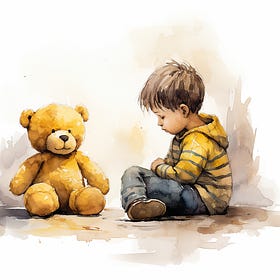Why is it possible that most of the family is fine, but one family member constantly struggles with weight, illness, failure, or financial difficulties? What exactly is the “fat kid” syndrome?
A few years ago, I remember sitting at the airport, observing the people around me, when a family appeared. Everyone had a normal physique, except for a boy around fourteen who clearly had a significant weight problem.
Just a few days ago, we were sitting in the restaurant at IKEA when another family appeared: two parents and two boys around the ages of ten to twelve. The iconic yellow IKEA bag was being carried by one skinny boy, lagging behind the rest of the family who held nothing. The energy surrounding them suggested a natural understanding of who carried the load.
Whenever I witness such scenes, it reminds me of what I call the “fat kid” syndrome. When the entire family seems to be doing well, but there's one individual struggling in some way—whether it’s with their weight, recurring failures, addictions, or any other issue—I often wonder: what burden are they carrying on behalf of others to maintain the balance in the family?
Often, one individual takes on a particular hardship to, for instance, make the family finally accept the ostracized grandfather who one day left and never returned, or perhaps to atone/pay for sins committed by ancestors.
This way, the rest can seemingly lead normal lives without grappling with financial, addiction, weight, or other problems, while that one family member bears the load.
Often, the others in some way compensate them, perhaps by overfeeding, funding their lives, or giving them the recognition and love they would never receive should they not agree to carry the load. Sometimes the compensation is merely affirming their secured position within the family.
Many children were so deprived of love and recognition that they'd do anything for a morsel of affection. (More about deprivation traumas in article “Deprivation Traumas and Their Surprising Consequences.”)
Others have experienced such profound traumas that they perceive the world as an extremely dangerous place, with resources being incredibly scarce; hence, it's easy to "persuade" them to bear the burden in exchange for some food, money, or sense of security. (More on childhood traumas in article “Can childhood trauma lead to serious adult illnesses?”)
The existence of the “fat kids” is beneficial in two ways: they bear the family’s burdens, and their presence allows other family members to see themselves as more attractive, successful, or capable by comparison.
But what happens when the “fat kid” grows up and doesn’t need security, money, food, love and acknowledgement to come through their parents? Will they still bear the burden?
In early childhood, such a compromise is understandable. The child makes this subconscious deal as they receive essentials in exchange for bearing the burden, essentials without which they couldn't survive. However, as adults, they could independently obtain food, security, financial means, and love if they chose to, yet more often than not, their role in the family remains unchanged. That ’s why usually the “fat kid” becomes the “fat adult” of the family, continuing to grapple with challenges in areas such as relationships, finance, career, and more. Remember, the fundamental reason for the family's burden doesn't go away just because someone grew up. So the load is still there, but why does the adult continue to bear it?
In my experience there are typically three reasons:
Part of the adult, still craves the unconditional love, unconditional security, and the genuine loving nourishment from their parents, that they never succeeded to get. They hope one day they will finally get it, their parents will finally see and acknowledge them for who they are and not for what they do for them. In most cases this is a futile but strong hope.
Breaking such a contract often has profound consequences, instilling fear in the adult. At best, they might face serious conflicts with family members. At worst, they risk being condemned or ostracized, leaving the "fat adult" isolated from their family. If someone was conditioned from a young age to believe they're incapable of self-reliance or of obtaining love, security, food, or money — a common mindset among the "fat kids" who made such compromises in childhood — it becomes challenging for them to believe they can achieve these things independently as adults. Even if their logical mind understands that circumstances were different in their youth, the deep-rooted fear persists.
Once the adult realizes the true nature of their situation and why they grapple with certain problems, they may seek retribution for their years of suffering and thus, continue to uphold the "contract" as a way of exacting payment from other family members.
I've rarely seen cases where just one reason was at play. Usually, all three must be addressed to change the "fat kid" persona. This involves healing the wounds of childhood caused by a lack of unconditional love and recognition, accepting the potential condemnation of the family, and letting go of our resentment and demand for recompensation for past childhood experiences. This issue usually doesn't resolve in one therapy session, but it's not an unsolvable problem. Undoubtedly, emotional maturity and significant courage are required. Once we see what needs to change, it takes determination not to revert to old patterns and bear the unavoidable conflicts. In essence, we need to realize that we need to renegotiate a beneficial deal, but this time with ourselves rather than our family.
– Eszter
Related Articles
Deprivation Traumas and Their Surprising Consequences
Can Childhood Trauma Lead to Serious Adult Illnesses?
Home | Notes | Articles | Eszter’s Magic | Literary Bonbons | Short Stories and Guides | Beyond the Book | EWE Issues | Archive | About






